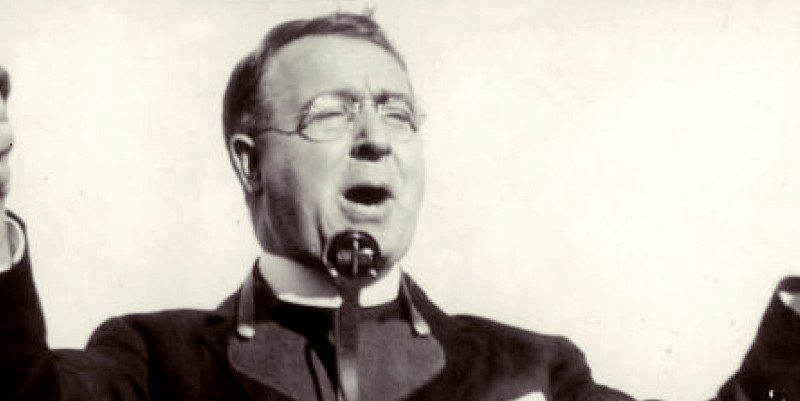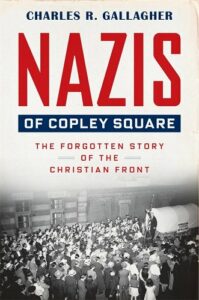In the summer of 1939, Father Charles Edward Coughlin, famed “Radio Priest” of Detroit, Michigan, called for the creation of a Christian Front. He hoped the group would act as a counterpoise to the Popular Front, adopted by the Seventh World Congress of the Communist International in 1935 and ostensibly aimed at reconciling revolutionary objectives with a commitment to democracy. As far as Coughlin was concerned, this was merely sleight of hand—a “nefarious . . . endeavor to Sovietize America” wearing “the false mask of liberalism.” In his broadcasts and his publications, Coughlin pushed his millions of followers to reject atheistic Communism in the name of Christ and country, and he saw a Christian Front as the key means of resistance.
Coughlin is familiar to readers of US history, especially those who have hoped to understand the influence of the far right on modern American politics. Less well known are the men and women who fought to make the dream of a Christian Front a reality. This book tells their story. They were American Catholics, led by now-forgotten lay acolytes like John F. Cassidy of New York and Francis P. Moran of Boston. The people who formed the Christian Front saw themselves as the advance guard in a holy war against Communists and Jews— groups whom they perceived as one and the same, under the rubric of what scholars have called Judeo-Bolshevism. This is also a story of how Catholics came to embrace anti-Semitic violence as theologically permissible. Along the way, the work of the Christian Front became embroiled with that of President Franklin Roosevelt, Prime Minister Winston Churchill, and the top brass of the Third Reich. There were terrorist plots in New York and Nazi spies in Boston. And there were priests. At its heart, the story of the Christian Front is one of priests who drew upon some of the most vibrant theological movements of the Catholic Church and used them to justify evil.
Priests provided political cover, theological leadership, and ecclesiastic approval for the far-right Christian Front movement. Although the front was a lay organization, priest advisers enabled its growth and prosperity, whether by promoting the front’s mission or by defending its members against their critics. When fronters got into trouble with the law, priests were there to rationalize and downplay their actions. Coughlin, the most famous priest of the 1930s, was the spiritual leader of the front, but he did not work alone. Fathers Edward Lodge Curran of Brooklyn and Edward F. Brophy of Queens both dedicated their energies to building up the Christian Front in New York and Boston from 1938 to 1945. The Jesuit Michael Ahern of Boston played a key role in preserving the front when it was under threat.
The details of the Christian Front receive little attention from historians. Its origins and genuinely Catholic philosophy have gone unexplored, as has the role of the Boston front during World War II, when Francis Moran knowingly served as a Nazi agent whose purpose was to propagandize on behalf of American neutrality—a task he took up in the name of Christ and the Church, not in the name of Hitler or the German volk. Even the front’s most notorious moment occupies hardly more than a footnote in the larger histories of the American right and the American Catholic Church: the 1940 sedition trial of John Cassidy and a small group of his New York fronters, who attempted to incite a revolution. Their goal was to install in the United States a temporary dictatorship that would eliminate Communists and Jews.
But the Christian Front was well known in the United States in its own time. The news coverage was voluminous, and the radio broadcasts were constant. Front rallies routinely attracted thousands of attendees. Governors, mayors, and police commissioners both loathed and courted the front. Joseph Goebbels, the commander-in-chief of Nazi propaganda, toasted Moran. British intelligence worked hard to take the front down; there is reason to believe Soviet spies also tried. A raft of US law enforcement and intelligence joined in the effort. The FBI’s Christian Front file amounts to 2,500 pages, equaling its file on Martin Luther King Jr. and the Southern Christian Leadership Conference. By sheer quantity of paper, the Christian Front investigation was one of the three largest the bureau ever undertook.
In 1940, when fronters were on trial, US Catholic leadership swept the organization’s deeds under the rug. But not only their deeds: what mattered above all to the front’s clerical protectors was that the defendants’ views never be associated with sincere Catholicism. Remarkably, prosecutors participated in this project, demanding that the front’s revolutionary action had nothing to do with religion. Yet every thing the front did, in New York and Boston, had everything to do with religion. The front propounded the myth of Judeo-Bolshevism because its pious working-class membership, radicalized by priests and charismatic laypeople, understood Communism to be a Jewish-led plot against Christianity. Fronters believed firmly in the deicide, the idea that Jews had killed Christ, and their leaders moved them from this age- old position toward a distinctly modern and violent blend of anti-Semitism and anti-Communism.
The paramilitarism for which the New York fronters were indicted reflected more than a simple excess of zeal. So did the explosion in Boston, in 1943, of police-abetted anti-Semitic street gangs inspired by the front. The front and its followers were acting on their true conviction. At the foundation of this conviction lay what I call theological anti-Communism, a novel doctrine blessed by the highest reaches of the Vatican, albeit the hierarchy never used this term. The Vatican approved the idea that Christians everywhere were linked spiritually and indeed physically in a single body engaged in a divinely ordained conflict with Communism. And because fronters understood Communism to be a Jewish plot, they extended the Vatican’s blessing to incorporate anti-Semitism, sacralizing their war on Jews.
This was not a war for capitalism. Fronters were not laissez- faire libertarians but rather populists with many socialistic preferences. They agitated for fairness under a system they called Christian economics, which meant business opportunities for everyday Christians, welfare for Christians in need, and redistribution from Jews to Christians. They were often anti-union, but because unions were perceived as infected by Communism. Some American far-rightists were “pro-business,” but the front often took aim at corporate barons. Coughlin despised Roosevelt and the New Deal but also championed Social Security.
The fronters were also not engaged in a war for America, although their avowed patriotism was not false, either. To the extent that they saw the United States as an expression of Christian values, they were passionate Americans. They were also covetous of their constitutional rights, especially the right of free speech, which they mistook as a guarantee against not only government censorship but also private sanction. Yet the fronters had little interest in democracy and no loyalty to the United States as such— only to their vision of the United States as a Christian nation.
From its first days to its last, the front served one master: religious faith. Its leaders preached hate, praised and worked for Hitler, and engaged in violence because they understood these actions as fulfilling the requirements of Catholic dogma.
___________________________________





















